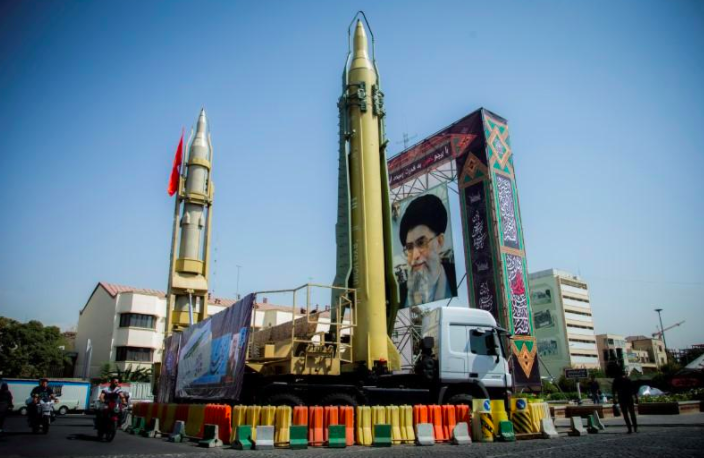By Babak Dehghanpisheh
BEIRUT, May 8 (Reuters) – U.S. President Donald Trump is not fit for his job, the speaker of Iran’s parliament said on Wednesday following his decision to back out of the international nuclear pact on Iran.
Trump pulled the United States out of the deal on Tuesday, raising the risk of conflict in the Middle East, upsetting European allies and casting uncertainty over global oil supplies.
“Trump does not have the mental capacity to deal with issues,” parliament speaker Ali Larijani told the assembly, broadcast live on state TV.

Members of parliament burned a U.S. flag and a symbolic copy of the Iran deal, known officially as the Joint Comprehensive Plan of Action (JCPOA), as a session of parliament began. They also chanted “Death to America”.
“Trump’s abandoning of the nuclear deal was a diplomatic show…Iran has no obligation to honour its commitments under the current situation,” Larijani said. “It is obvious that Trump only understands the language of force.”
General Mohammad Baqeri, the chief of staff of Iran’s military, said Iran had not had to sign the deal.
“But that arrogant country (America) did not even stand by its signature,” the Islamic Republic News Agency (IRNA) quoted him as saying.
President Hassan Rouhani said on Tuesday Iran would remain committed to the deal without Washington despite Trump’s decision to withdraw from it. The pact was designed to deny Tehran the ability to build nuclear weapons.
“If we achieve the deal’s goals in cooperation with other members of the deal, it will remain in place. … By exiting the deal, America has officially undermined its commitment to an international treaty,” Rouhani said in a televised speech.
“I have ordered the foreign ministry to negotiate with the European countries, China and Russia in coming weeks. If at the end of this short period we conclude that we can fully benefit from the JCPOA with the cooperation of all countries, the deal would remain,” he said.

French Foreign Minister Jean-Yves Le Drian said the deal with Iran was “not dead” and added that President Emmanuel Macron would speak later in the day to Rouhani.
Le Drian said Macron’s contact with Rouhani would be followed by meetings next week, probably on Monday, involving the Iranians and European counterparts from France, Britain and Germany.
Trump’s decision drew fierce criticism from Iranian officials and could give hardliners long opposed to the deal a greater edge over Rouhani.
“The biggest damage of the Iran deal was legitimizing and sitting at the negotiating table with America,” Iran’s army chief Seyed Abdul Rahim Moussavi said, according to the Iranian Students’ News Agency (ISNA).
Moussavi said America’s withdrawal from the Iran deal should also be a lesson to Saudi Arabia which was drawing closer to the United States, ISNA reported.
Shi’ite Muslim Iran has been locked in a regional power struggle with Sunni Muslim Saudi Arabia that has spilled into the wars in Syria and Yemen, where they have backed opposing sides, and fuelled political rivalries in Iraq and Lebanon.
The United States’ Gulf Arab allies, who see Iran as a major security threat, expressed strong support for Trump.
Under the deal, struck between Iran, the United States, Russia, China, Britain and France and Germany, Tehran curbed its nuclear programme in return for them lifting sanctions.
‘SHENANIGANS’
Trump’s decision sets the stage for a resurgence of political infighting within Iran’s complex power structure, Iranian officials told Reuters. It could tip the balance of power in favour of hardliners looking to constrain Rouhani’s ability to open up to the West.
“They will blame Rouhani. They will continue their shenanigans at home and abroad. And they will have the U.S. to blame for the failure of the economy,” said Abbas Milani, director of the Iranian Studies programme at Stanford University.
Rouhani tried to assure ordinary Iranians, frustrated by high unemployment and stagnant living standards, that Trump’s decision would have no impact on Iran’s oil-reliant economy.
“Our heroic people will not be affected by this psychological attack…Iran’s economic progress will continue. Our people should not be worried at all,” he said.
Iran’s ruling elite fears a revival of anti-government protests in January that revealed the establishment was vulnerable to popular anger fueled by economic hardship. At least 21 people were killed in the protests.
TOUGH STATEMENT
Trump said he would reimpose economic sanctions on Tehran immediately. His decision puts pressure on his European allies, which are reluctant to join the United States in reimposing sanctions on Iran.

The U.S. Treasury said the United States would reimpose a wide array of Iran-related sanctions after the expiry of 90- and 180-day wind-down periods, including sanctions aimed at Iran’s oil sector and transactions with its central bank.
Iran’s supreme leader, Ayatollah Ali Khamenei, whose hostility towards Washington is the glue that holds together Iran’s faction-ridden leadership, had said Iran would “shred” the deal if the United States pulled out.
Rouhani said Iran was ready to resume its curbed nuclear activities if Iran’s interests were not guaranteed under a deal without the United States.
Under the2015 deal, Iran stopped producing 20 percent enriched uranium and gave up the majority of its stockpile in return for most international sanctions on it being lifted.
(Additional reportin by Bozorgmehr Sharafeddin in London and Parisa Hafezi in Ankara and Brian Love and Matthias Blamont in Paris Writing by Parisa Hafezi, Editing by Michael Georgy and Angus MacSwan)

